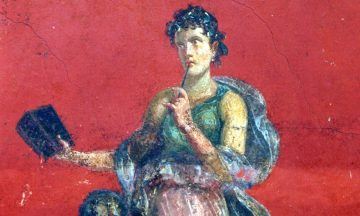Charlotte Higgins in The Guardian:
 At the centre of Natalie Haynes’s absorbing, fiercely feminist new novel A Thousand Ships, about the women caught up in the Trojan war, is Calliope, the muse of epic poetry. Here, the goddess invoked at the start of Homer’s Iliad and Odyssey has something to say about the story that is being told under her guidance:
At the centre of Natalie Haynes’s absorbing, fiercely feminist new novel A Thousand Ships, about the women caught up in the Trojan war, is Calliope, the muse of epic poetry. Here, the goddess invoked at the start of Homer’s Iliad and Odyssey has something to say about the story that is being told under her guidance:
There are so many ways of telling a war: the entire conflict can be encapsulated in just one incident. One man’s anger at the behaviour of another, say … But this is the women’s war, just as much as it is men’s, and the poet will look upon their pain – the pain of the women who have always been relegated to the edges of the story, victims of men, survivors of men, slaves of men.
“One man’s anger at the behaviour of another” is a way of summing up the plot of the Iliad: the wrath of Achilles, directed at the Greek commander-in-chief, Agamemnon. The quarrel between the two men, who are ostensibly on the same side, is about the apportioning of loot – predictably enough, a captured woman, Briseis – and the stakes are so high because Achilles is by far the better fighter. When Agamemnon insists on pulling rank and taking Briseis, Achilles withdraws from the conflict, and the Greek invaders of Troy are pushed to the verge of defeat. Eventually, after the death of his beloved companion Patroclus, Achilles enters the battle, and the poem culminates in his slaughtering of Hector, Troy’s greatest warrior.
Haynes’s book is emphatically not this: it is, as Calliope’s intervention explains, the story of the shadowy women on the edges of Homer’s poem, who nonetheless – in Briseis’s case, in Helen of Troy’s case – drive the plot. A Thousand Ships is one of a trio of recent novels by women that, to a greater or lesser degree, rewrite the Homeric epics from the point of view of female characters. Madeline Miller’s beguiling Circe has the witch from the Odysseyat its centre, while Pat Barker’s remarkable The Silence of the Girls retells the Iliad from the perspective of Briseis. Towards the end of Barker’s novel, Briseis ponders how the war will be remembered. “What will they make of us, the people of those unimaginably distant times? One thing I do know: they won’t want the brutal reality of conquest and slavery. They won’t want to be told about the massacres of men and boys, the enslavement of women and girls. They won’t want to know we were living in a rape camp.”
More here.
